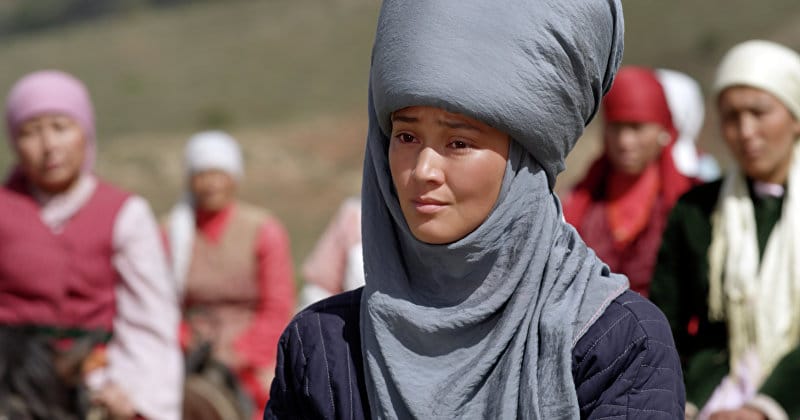In 1984, the Georgian director Tengiz Abuladze made a film called Repentance. It was quickly banned for its truly daring allegorical depiction of Stalin’s terror and how future generations of leaders suppress the truth of the crimes of their ancestors. However, Gorbachev’s glasnost policies unearthed the film and allowed for its domestic and international release in 1987. During its fairly short run, after which it was again quietly shelved in the USSR, it shocked Soviet filmgoers and gained attention in Europe and the USA, even taking the Grand Jury Prize at the Cannes Film Festival.
Alex Harry performed the research for this article while on an SRAS-supported program in Georgia led by his professor at the University of Richmond.
Overview of Repentance
Abuladze obviously intended to make a provocative and bold film that would shake up the Soviet political and cultural landscape. One Soviet man, quoted in the NY Times in 1986, said in response to the film that ”You just don’t see these things here.” In a conversation I had with Georgian film critic Liza Alpaidze in Tbilisi, the release of Repentance “was a watershed moment, as it allowed Soviet citizens to openly discuss the horrors of the Stalinist era.”
Abuladze stated, in that same NY Times article, that in making the film, he hoped to break the silence about the past, because only in this way could one hope to prevent such cruelty and oppression from happening again. The film clearly succeeded in its primary objective, helping to represent this era of free expression (glasnost means “openness”) that precipitated the end of the Soviet Union. Today, nearly 35 years later, it is still regarded in Georgia as a monument to film making and the struggle for freedom and truth.
Repentance begins with the funeral of Varlam Aravidze, the mayor of a Georgian town, where he is honored immensely by his son Abel, his son’s family, and most of the town. After Abel and his family bury Varlam, they leave the funeral with every intention of living the rest of their lives in peace. After all, they have commemorated Varlam’s accomplishments and will simply ignore and stay silent about Varlam’s cruelty. However, a woman named Ketevan, a childhood survivor of Varlam’s violence, exhumes Varlam’s corpse and dumps it in Abel’s backyard. She exhumes the corpse repeatedly until she is finally shot in the arm by Tornike, Varlam’s grandson.
In court, Ketevan states that she will continue her protest so the people will never forget Varlam’s crimes. Ketevan explains how her artist father and mother were arrested and “disappeared” by Varlam for attempting to resist his rise to totalitarian rule. Influenced by Abel and his family, the justice system reprimands her to a mental asylum. However, the ruling family’s life collapses when Tornike himself starts to fight against his parents and against Varlam’s legacy. Tornike eventually commits suicide, and Abel, grieving and now conflicted over his father’s legacy, unearths Varlam’s body one last time and throws it off a cliff.
Repentance uses absurdism and surrealism to critique totalitarianism and show how it manifests itself. Varlam presents himself as eccentric, playful, and benevolent, all while consolidating power.
Ketevan’s flashbacks include a parade full of surrealistic images and actions that give the memories a dream-like quality. Varlam is shown in a flashback visiting Ketevan’s father’s house, where he plays a loud and joyous song and even exits dramatically by jumping out the window, all the while threatening Ketevan’s father. This mirrors how Stalin presented himself as a compassionate, warm, and authentic leader to the Soviet people even while ruthlessly stamping out dissent. In another flashback, Varlam is shown in church he later destroys which has been repurposed as a science lab. The symbols of Christianity are surrealistically contrasted to large computers and other scientific machines with red spiraling coils filling the room. This may also mirror the bewildering sense of terror and disorientation that people felt during Stalin’s time, when it was impossible to understand one’s surroundings or predict the behavior and intention of any person trapped in a vast system of fear and deceit.
Dream sequences coming from Abel, as he becomes conflicted over Varlam’s crimes also add to the surrealism. In one, Abel faces a mysterious grim reaper figure who is eating a rotten fish. The reaper then revealed to be Varlam, who is thus shown to be the source of the rot planted in Abel’s family and community. In another arresting shot, Abel’s face is distorted in a broken mirror, reflecting his profound insecurity and psychological splitting over his actions.
The absurdism and surrealism in Repentance capture what must have been a nightmarish feeling of living under Stalin’s rule, and to show that Stalin’s propaganda was only a vain and absurd mask covering rot and confusion beneath. Director Tengiz Abuladze’s striking cinematography and portrayal of extreme situations is also obviously meant to excite the imaginations of viewers and incite them to discuss the film afterward, connecting more directly with their own emotions and memories.
Contemporary Reception of Repentance
Despite the praise and recognition Repentance has received as a classic by Georgians, this does not mean that modern Georgians view the film uncritically. In my conversation with film critic Liza Alpaidze, she explained, “Modern Georgians, or at least some of the film professionals, including me, see this film as a bit too theatrical and too straightforward. Also, my problem with the film is that it somehow makes you think that all the evil was one man, not the whole system.”
In short, today’s young Georgians may have a different perspective. For them, the moral of Repentance may seem almost too easy – in the late 1980s, it was possible to blame all of society’s woes on Stalin’s legacy. For a moment, perhaps it seemed possible that by exhuming a figure from the past and throwing it off a cliff, that the many problems in Georgian society would be solved. Protests in the streets of Georgia now are against the elected parliament’s consideration of bills that some fear will lead to repression of civil society. The system again seems broken, but Repentance no longer gives a satisfying answer about who is to blame. Despite this shift in perspective, Repentance is still seen as a representation of fighting against authoritarianism and for justice. According to Alpaidze, Repentance is still an inspiration for more than 450 Georgian filmmakers who are striking against the government over recent legislation.
The warning that Repentance holds about would-be populist authoritarians resonated with me as an American. For me, Varlam could be related to Donald Trump, who presents himself as a friend to his supporters, even as he threatens great harm to many innocent people he categorizes as enemies. With both Varlam and Trump, their projected confidence inspires some to unwavering loyalty to whatever they say or do. Both are also typical of today’s populists, who present themselves as strong and supportive leaders representing the people (the in-group) while also vowing to fight and destroy the out-group.
Aesthetically, Abuladze also made the decision to give Varlam the appearance of a generalized dictator. Varlam resembles Hitler and Mussolini, with the thin black mustache and military-cut clothes, which further contributes to Repentance’s universal message against authoritarianism.

Repentance is an important movie about how totalitarian regimes rise and function and how their crimes are ignored by the following generation. The film urges us not to ignore. The final shot brings home this point in a beautiful way: An old lady asks Ketevan where the destroyed church is. She knows this place used to have a church, and she won’t forget about it. In this way, the film conveys the idea that authoritarian regimes cannot stamp out memory and because of this, there will always be people who stand in the way of any regime trying to assert totalitarian dominance over a people.
You’ll Also Love

Films of Eldar Ryazanov, Moral Voice of the USSR
Eldar Ryazanov is remembered as one of the most influential and beloved directors in the post-Stalin Soviet era. Phrases from his movies, which is often co-wrote are still quoted by Russians as much as pieces of folk wisdom as pop culture references. He is best known for light comedies that also delivered social reflection, moral […]

Repentance: A Georgian Film and a Warning To The World
In 1984, the Georgian director Tengiz Abuladze made a film called Repentance. It was quickly banned for its truly daring allegorical depiction of Stalin’s terror and how future generations of leaders suppress the truth of the crimes of their ancestors. However, Gorbachev’s glasnost policies unearthed the film and allowed for its domestic and international release […]

Kurmanjan Datka: American Students Review a Modern Kyrgyz Film
Kurmanjan Datka is a historical drama about a woman who helped unite Kyrgyzstan’s fourty tribes into a nation to fight the invading Russian forces. Recently, a modern film was made of her life and deeds. It is called simply Kurmanjan Datka, although it was released with English subtitles with a second name: Queen of the […]

Chernukha: Russia’s Tough Truths Through The Filmmaker’s Lens
Glasnost’ (Гласность), a political and social policy spearheaded by Soviet leader Mikhail Gorbachev (Михаил Горбачёв) in the USSR in the late 1980s, described an increased ability of Soviet citizens to openly discuss problems in their country. Glasnost’ affected nearly all aspects of society, including filmmaking. Filmmakers of the late Soviet period used their newfound freedom […]

The Hunter (2011): Learning Russian Through Film
The Hunter (2011; Охотник), directed by Bakur Bakuradze, is a film of few words. Starring Mikhail Barskovich, Tatyana Shapolova, and Gera Avdochenok, the film employs lesser-known actors in the creation of this deeply moving picture. The film was critically well received and was nominated for the UN Certain Regard Award at the 2011 Cannes Film […]





